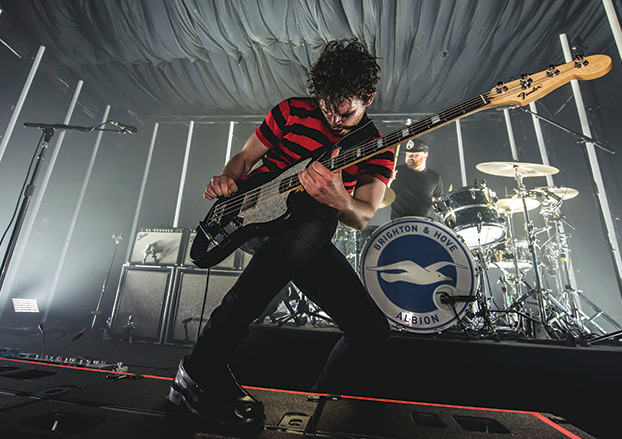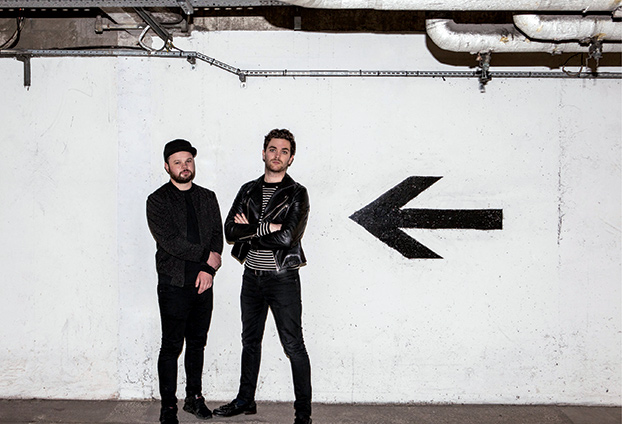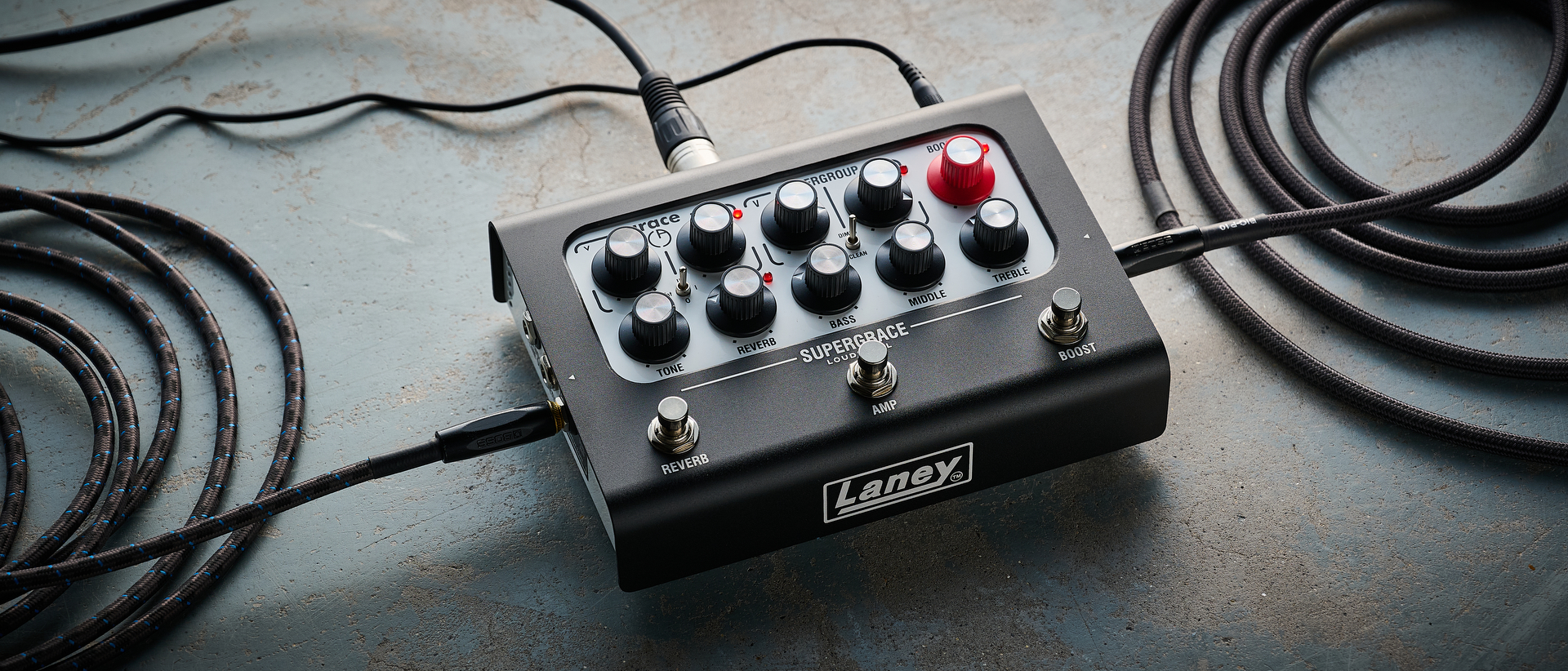All the latest guitar news, interviews, lessons, reviews, deals and more, direct to your inbox!
You are now subscribed
Your newsletter sign-up was successful

Mike Kerr, who is one-half of the British-based rock duo royal blood (he’s the singer-bassist component; ben thatcher handles the drums), has two distinct views on being in a two-man band.
“On the one hand, the duo thing forces us to be creative because we can’t rely on other people to fill up the space,” he says. “That allows me and ben to improvise more because it’s all on us. In a bigger band, you have this big ship you have to guide and turn around. That makes it hard to go off, so you have to stick to the tune and follow a lot of rules. We don’t have that, so it’s cool.”
On the other hand, Kerr sees the band’s limitations as sometimes being, well, just that—limitations. “There’s a certain amount of impatience that we feel being just two people,” he says. “Sometimes you can feel stuck. You want to do those other tricks that other bands can do. Maybe it would be fun to share what we do with other musicians onstage, or it might be cool to just let somebody else pick up the slack while I concentrate on singing or whatever. But we don’t dwell on that. We are what we are, and it’s what we want to be.”
On their pummeling eponymous debut album from 2014, Royal Blood were routinely compared to the White Stripes, but their aesthetic actually owed more to the metallic/stoner rock wallop of another power duo, Local H. But whereas that band’s frontman, Scott Lucas, runs a hybrid guitar (outfitted with bass pickups) into bass and guitar amps, Mike Kerr opts for a bass that he sends into pitch shifters and other various stomp boxes (including one that’s a closely guarded secret).
The resulting sound is as thick and lowdown as EDM’s bottom frequencies, and when matched with Kerr’s sweet tenor and the band’s crafty way with pop hooks on tracks like “Little Monster” and “Out of the Black,” it’s a recipe that sizzles.
Royal Blood’s debut album hit No. 1 in the U.K. and landed in the Top 20 in the States, and thanks to high-exposure tours with the Arctic Monkeys and the Foo Fighters they established themselves as a powerful live act. Conventional wisdom would have the band issue a speedy follow-up, but Kerr and Thatcher opted for a different approach, spending over a year to record How Did We Get So Dark?
“There was no reason to rush something out,” Kerr insists. “We had been on the road for so long and were in people’s faces so much. We wanted everyone to kind of miss us a bit. There’s nothing wrong with that. That’s what a band should do. You gotta go away for a while.”
All the latest guitar news, interviews, lessons, reviews, deals and more, direct to your inbox!
Musically, How Did We Get So Dark? is every bit the earth-mover as its predecessor, but in some ways it’s lighter, too: Ear candy background vocals brighten the tumult of bruisers like “Look Like You Know” and “Hook, Line and Sinker,” and there’s a frol-icky air of psychedelic weirdness that permeates tracks such as “She’s Creeping” and “Where Are You Now?” While Kerr and Thatcher never stray too far from the sound of their bass/drums dynamic, they open things up significantly on the irresistible dance-rocker “Hole in Your Heart,” which is built on a hypnotic, Doors-like keyboard riff.
“I’m playing a Fender Rhodes on that one,” Kerr notes. “It wasn’t a conscious thing, like, ‘Okay, let’s try to sound different.’ The keyboard was just sitting there in the studio, and I started fucking around with it one night. I happened upon this riff, and it sounded cool. I don’t know if it’s something I’ll continue with. It’s hard to tell—this is only our second album. We’ve got a long way to go.”
Photo: Perou

Here you guys are with your second album, but it comes at a time when full-length records aren’t as meaningful to young people as they once were. Do you feel like you missed out on the golden era of albums?
I mean, yes, in a way. It’s interesting, isn’t it? Obviously the way that people consume music now is through streaming, and I’m kind of guilty of doing the same thing. The album format is like a rare breed now, and it just is what it is. That said, I believe that because of the type of music we make and because of the type of fans that we have, the album format has a lot of value.
Also, there’s vinyl—that’s where the format lives. A lot of our fans are into vinyl. They’re dipping back to that ritual of buying a record, going home and listening to it, flipping it over. It’s not as big as streaming, but it’s there. So as long as we have that, we’ll make albums, even if less people appreciate them.
Are you a little surprised at how quickly things happened for you? You made a big splash in the States, you played stadium shows with the Foo Fighters—all on the first record.
Yeah, we achieved a lot on that first one. I think it’s down to a combination of the fact that we toured like crazy and we tried to make every show count. We’re so grateful to the Foo Fighters for having us out on that tour, and that really helped us in America; we got to play to thousands of people every night. It would be mad if I were to tell you that I wasn’t surprised at the rate of acceleration we’ve experienced.
You and Ben wrote some songs separately for the new album. What brought about that change? Was there any kind of conflict?
No, there was no conflict. It was curiosity, kind of a “What if…?” Ben and I have been playing and writing together for years, but I think the idea for this album was to try and maintain our sound while going in some new directions. What’s that definition of madness—doing the same thing over and over and expecting a different result? It actually felt fine and kind of natural to try writing separately, and we got some great tunes out of it. But we also wrote some pretty great tunes in the same room together. There’s are no rules for songwriting anyway, you know?
You were going through a bad breakup in your personal life while writing the record. It’s often said that pain is a catalyst for good material.
I mean, that’s just there, isn’t it? I think some of my favorite records have been written from that viewpoint. The experience made it very clear what the record was going to be about and what the concept was. That was just something that happened naturally and organically, and I was just being true to myself. I can only write lyrics from an honest place, so there was no getting around it.
Overall, your songs are pretty short and tight. Do you two have a sort of mission statement? “Trim the fat. No extended jams”?
Kind of. The music we like is catchy and poppy, so it’s just natural that we get to the point. Truth is, we get bored quite quickly, so if things are snappy we probably won’t lose our enthusiasm.
We talked about you playing the Fender Rhodes on “Hole in Your Heart.” Do you think that stems from any kind of subconscious desire you have to go beyond the two-piece setup? You hinted at that a little.
I don’t think so, no. We haven’t experienced any kinds of growing pains or anything. Coming off the last tour, I felt pretty confident as a bassist, so I was really into it. I’d just started playing bass on the first record, and I didn’t really know what I was doing. Maybe that made for some creative songwriting—I don’t know. But my chops feel really fired up now, so I’m not holding back.
Jolyon Thomas was the main producer on this album, but you two went back to your first producer, Tom Dalgety, to work on some songs. Was something missing in what you did with Jolyon?
We’d spent a long time working with Jolyon on the initial eight tracks that we had in mind, and by that point we wanted a fresh set of ideas and a new approach. Tom’s got a trusted pair of hands. He’s brilliant and he’s a friend, so it was a simple decision to go to him. Bringing him into the equation was all about staying fresh. We’d spent a long time in the studio with Jolyon, so being with Tom felt new again.
“I Only Lie When I Love You” has more of a bluesy vibe than anything you’ve ever done. Where does that come from? Do you listen to a lot of blues?
I’m no blues buff at all, man. I mean, I love the blues, but I tend to go for things that are more influenced by the blues and aren’t straight blues. I wanted to write a song that was like the Hives or something. Also, it didn’t feel like we had this kind of rock and roll tune, something more Rolling Stones and Hives-y.
The riff of “How Did We Get So Dark?” is the backbone of the song. You have a few that are like that. What’s your riff writing process?
That comes from me making recordings on an acoustic late at night. I collect them and go through them, and there’s always ones that stick around. I always write songs that are riffy, but in fact I usually sit at the piano and write the song before I have riffs. We love riffs, but we love songs, so it’s a bit of everything.
How do you get that real “squashy” bass sound on songs like “She’s Creeping”?
That’s just me fucking around in the studio, really. I don’t use a lot of sound effects. I kind of pretend to use amp distortion, but a friend of mine loaned me a couple of these fuzz pedals, and they sounded cool. As an aesthetic, tonally, we wanted the whole album to be varied. We’re very conscious of not wanting to repeat ourselves. Every song had to feel like a step forward rather than like a step sideways.
Some of your songs start out with riffs that sound like a guitar, but “Lights Out” begins with a sound that’s unmistakably bass.
Again, that was just something we hadn’t done before. I realized that I’m playing bass that sounds like a guitar, so I thought we should have one that sounded like I’m playing traditional bass. It sounded new—new for us.
From a sonic standpoint, what’s the hardest part of recording you guys? Some of your bass frequencies are really low—they rival EDM.
Getting the bass tones is probably what takes the longest. We spend a long time on amps and dialing in all the frequencies so that we have a really full sound. I’m taking up a lot of sonic space there, but it has to sound interesting. I don’t know if we try to make it as low as we can. We use a lot of low tunings, so it starts from there. I think just having two people allows me to fill the space and things just stand out more.
What kind of basses are you using? Last time we talked, you were using a Gretsch Electromatic Jr. and a Fender Starcaster.
I’m still using the Starcasters, and I’m also using these custom short-scale Jaguars that Fender made for me. They’re so good that I used them on nearly the whole record. They’re so much fun to play—they’re kind of my new love interest.
And what about amps? You used to use Ampeg SVTs and GVTs. But I see that you’re now using Fender Bassmans and Super-Sonics.
Yeah, the Bassmans are great. I’m Fender because I really like the sound of the Super-Sonics. Super-Sonics and Bassmans are what I’m using at the moment. I mean, it’s always evolving. I think the Ampegs are more of a studio thing. I’m all Fender at the minute.
Okay, let’s get into your pedalboard. Last time we talked, you were quite cagey about what you were using.
And I still don’t want to talk about it, to be honest. Because…it’s fun not to. [laughs]
Oh, come on.
I like keeping secrets, man. I mean, everyone knows I use an octave pedal, a POG2 [Electro-Harmonix]. I use that live mainly. To be honest, I don’t really use a lot of effects. Apart from the POG, there’s one thing in particular that I’ve never told anyone about, something I use live, and I’m not about to tell you now, unfortunately.
But I’ve been so nice to you. We’re close friends now, right?
Sorry. It’s the one main thing that I hold close to my chest that no one has caught on to ever. It’s my little secret, and it’s gonna stay with me.
You’re using a Zvex Mastotron Fuzz pedal?
Yeah, I do use one of them on “Loose Change.”
And what about an Electro-Harmonix Big Muff?
Not anymore with that one. I actually don’t. Early on I did, maybe.
What about noise suppressors or equalizers?
No equalizers. My tech has built such a good pedalboard for me that I don’t need any kind of noise suppressors anymore. It’s all good. I did use them for a bit because I wanted us to sound tight.
Okay, so the setup is pretty minimal. Even so, for a two-man band, if a piece of gear drops out onstage, it could be the end of the show. You don’t have other members to pick up the slack.
That’s true, but that’s just part of the risk. Every time you go out onstage, you know what can happen. You have to take that risk, I think. If the song stops and it’s fucking not coming out, it doesn’t matter. We’ll just work it out somehow. We don’t really care.
Joe is a freelance journalist who has, over the past few decades, interviewed hundreds of guitarists for Guitar World, Guitar Player, MusicRadar and Classic Rock. He is also a former editor of Guitar World, contributing writer for Guitar Aficionado and VP of A&R for Island Records. He’s an enthusiastic guitarist, but he’s nowhere near the likes of the people he interviews. Surprisingly, his skills are more suited to the drums. If you need a drummer for your Beatles tribute band, look him up.

